Part II
AUTHOR: Tatiana Nikulina, Expert in Sports Volunteering Operational Management NR SVS
Volunteering plays a crucial role in the success of various events and initiatives, fostering community engagement and creating a positive impact. However, in countries with a low level of volunteering culture, recruiting volunteers can be a challenging task. To effectively recruit volunteers in such environments, it is essential to employ specific strategies and channels. In this article, we will explore strategies for recruiting volunteers, drawing on the experiences from the Kazan 2013 World Summer Universiade and Tbilisi 2015 European Youth Olympic Festival events.
Raising Awareness
The first step in recruiting volunteers is to raise awareness about the benefits and opportunities associated with volunteering. In Kazan 2013 and Tbilisi 2015, presentations in schools, universities, and youth organizations were used to inform and inspire potential volunteers. These presentations helped students understand the culture of volunteering and the specific opportunities available at the events. The volunteer programs generated interest and enthusiasm by directly engaging with the target audience.
Tailored Promotional Programs
It is essential to design promotional programs that cater to the interests and aspirations of the target demographic. In the case of Kazan 2013, special contests and competitions, such as the “Polyglot” contest for students with proficiency in multiple languages and the cheerleader’s contest, were organized. These initiatives appealed to specific groups and generated additional interest in volunteering. Similarly, Tbilisi 2015 used online activities, contests, and motivational events to engage potential volunteers. Recruitment efforts can be more effective by tailoring promotional efforts to the target audience’s preferences.
Leveraging Partnerships
Collaborating with schools, universities, and relevant government ministries can greatly enhance recruitment. Kazan 2013 and Tbilisi 2015 formed partnerships with educational institutions, allowing for structured promotional programs and student presentations. Additionally, partnerships with youth and sports ministries from different regions helped recruit volunteers from diverse backgrounds and made the events more inclusive. By leveraging existing networks and relationships, recruitment efforts can reach a wider pool of potential volunteers.
Showcasing Success Stories
Highlighting the achievements and experiences of previous volunteers can be a powerful recruitment tool. In Tbilisi 2015, the volunteer program strategically showcased the performance of volunteers during the European Athletic Championships 3rd League – an event held in Tbilisi 1 year before the EYOF. The media attention generated from this event helped spread the message about volunteering and attracted more applicants. By sharing success stories and testimonials from past volunteers, potential recruits can gain insights into the rewarding nature of volunteering and be inspired to participate.
Incentives and Rewards
Offering incentives and rewards can further motivate individuals to volunteer. While financial compensation may not be feasible, other forms of recognition and appreciation can be provided. For example, volunteers can receive certificates, badges, or exclusive access to events and venues. Recognition events or ceremonies can also be organized to acknowledge the volunteers’ contributions. Volunteers feel valued and appreciated by providing tangible and intangible rewards, increasing their satisfaction and commitment.
In conclusion, recruiting volunteers in countries with a low volunteering culture requires targeted strategies and creative approaches. Organizations can effectively engage potential volunteers by raising awareness, tailoring promotional programs, leveraging partnerships, showcasing success stories, and providing incentives and rewards. The experiences of Kazan 2013 and Tbilisi 2015 demonstrate the effectiveness of these strategies in overcoming recruitment challenges and creating successful volunteer programs. With thoughtful planning and implementation, countries with a low volunteering culture can cultivate a vibrant volunteer community and foster active citizen participation in various initiatives.


